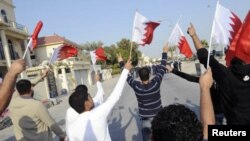There has been more violence in Bahrain. Prominent activist Nabeel Rajab was injured and hospitalized after he was attacked by riot police at a recent protest.
Officials from the U.S. Embassy in Manama met with Mr. Rajab. They also spoke with senior Bahraini government official regarding the incident. While the facts surrounding the violence that took place remain in dispute, the United States strongly urges the government of Bahrain to undertake a full investigation to determine if excessive force was used by police.
Mr. Rajab is one of hundreds of protesters to be injured since the unrest began in Bahrain last February and has been a target for his work in Bahrain. The United States is deeply concerned by these continuing incidents of violence between police and demonstrators. The U.S. urges all protesters to refrain from acts of violence and for police and security forces also to avoid excessive use of force.
The uprising in Bahrain began on February 14th, 2011, as a series of demonstrations that continue to this day. Bahraini protesters initially called for greater freedom and equality for the majority Shi’a population. Some protesters’ demands were more extreme, calling for the end of the monarchy.
Protesters in Manama camped out for days at the Pearl Roundabout, which functioned as the center point of protests. On February 17th, security forces cleared the roundabout, leaving four dead. Protesters returned without interference days later, and after a month, the government welcomed the entry of troops and police from neighboring countries as part of a Gulf Cooperation Council Peninsula Shield Force, when King Hamad declared a sort of martial law for the next two and a half months.
Protesters have demanded accountability for the abuses, and the government has taken some initial steps to address them.
King Hamad established the Bahrain Independent Commission of Inquiry to study the period of unrest and offer recommendations to address the abuses. The report, released in November, confirmed the Bahraini government’s use of torture and “culture of impunity” within the security forces, and offered a series of recommendations.
More Violence In Bahrain

Prominent activist Nabeel Rajab was injured and hospitalized after he was attacked by riot police at a recent protest.



